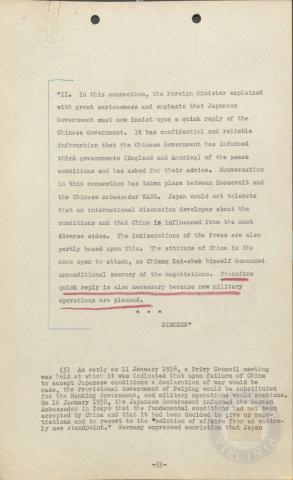
Page 53
| Parent | Collaboration Between Japan, Germany and Italy - Volume II |
|---|---|
| Date | 25 November 1941 |
| Language | English |
| Collection | Tavenner Papers & IMTFE Official Records |
| Box | Box 15 |
| Folder | Japan, Germany, Italy Collaboration Vol 2 |
| Repository | University of Virginia Law Library |
"II. In this connection, the Foreign Minister explained
with great seriousness and emphasis that Japanese
Government must now insist upon a quick reply of the
Chinese Government. It has confidential and reliable
information that the Chinese Government has informed
third governments (England and America) of the peace
conditions and has asked for their advice• Conversation
in this connection has taken place between Roosevelt and
the Chinese Ambassador WANG. Japan could not tolerate
that an international discussion developes about the
conditions and that China la influenced from the most
diverse sides. The indiscretions of the Press are also
partly based upon this. The attitude of China is the
more open to attack, as Chiang Kai-shek himself demanded
unconditional secrecy of the negotiations. Therefore
quick reply is also necessary because new military
operations are planned.
DIRKSEN
(5) As early as 11 January 1938, a Privy Council meeting was held a twhich it was indicated that upon failure of China to accept Japanese conditions a declaration of war would be made, the Provisional Government of Peiping would be substituted for the Nanking Government, and military operations would continue. On 16 January 1938, the Japanese Government informed the German Ambassador in Tokyo that the fundamental conditions had not been accepted by China and that it had been decided to give up negotiations and to resort to the “solution of affairs from an entirely new standpoint.” Germany expressed conviction that Japan
